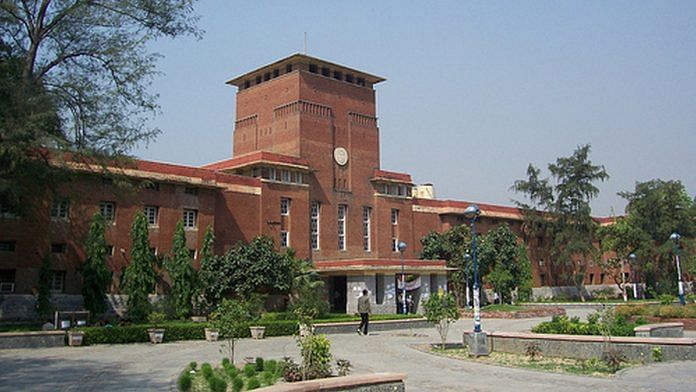New Delhi: While Delhi University is gearing up to re-introduce the four-year undergraduate programme (FYUP), possibly in the next academic year, teachers have expressed concerns that the new system ignores their welfare.
The revised FYUP, which will return as part of the new National Education Policy (NEP), offers multiple exit options to students within the same course.
For instance, a student can leave a course after one year and get a certificate, after two years for a diploma and receive an honours degree after three years. If a student chooses to complete all four years, they will receive a four-year undergraduate degree.
However, the university’s teachers expressed concerns about the rushed implementation of this system and how the multiple exit route could lead to a decline in faculty hirings.
Professor Prem Chand, joint secretary of Delhi University Teachers Association(DUTA), told ThePrint: “There are several problems with the FYUP but the most pressing concern is with the implementation of the ‘honours’ programmes. For mainstream commerce subjects, the workload will remain the same but for teachers of subjects like Hindi, English Literature, Political Science the work might reduce. The culprit behind this is the exit option given to students, they might choose to drop out after two years, this may lead to a cap in the number of teachers hired.”
“We are compiling a list of our grievances and will soon be sending them to the vice chancellor of DU,” he added.
According to Sudhanshu Kumar, a member of Academic Council and a Hindi Professor, permanent hirings could be hit due to FYUP.
“How will college decide what the workload for professors should be like? With the exit option, the uncertainty about the number of students, the jobs of professors are at threat,” he said.
Dr Seema Das, a member of the NEP Implementation Committee and a member of the Executive Committee at DU, further noted, “The exit option would make work load variable. The new course structure may take another four years to stabilise. With inadequate infrastructure and mass ad hocism, there is no clarity as to how they would implement this.”
ThePrint reached the Ministry of Education via email for a comment but did not receive a response till the publishing of this report.
Also read: Why attendance at DU colleges is under 40% even 10 days after classes resumed partially
30% online classes under FYUP
The FYUP also has an additional provision of 30 per cent online classes, which has worried teachers.
Delhi University, like all other educational institutions in the country, had shifted to virtual classes due to the Covid-19 pandemic, and continues to do so. However, according to teachers, the shift was extremely difficult to implement due to technological gaps and lack of infrastructure.
“The UGC didn’t create any mechanism for online instruction but put this order for implementation. Luckily for the faculty, the pandemic taught us how to take classes online. The concern with this will remain the same as it is now, there will be no assessment to gauge how effective the online teaching method is,” said Kumar.
Responding to these apprehensions, DU’s acting vice-chancellor P.C. Joshi said that instead of reducing workload, the new system is likely to increase the teachers’ workload.
“The FYUP under the NEP is a step towards liberalisation of the Indian education system. I don’t think it will reduce the workload or hiring of teachers, on the contrary it stands to increase the workload of teachers,” Joshi told ThePrint.
He added: “As for problems with online education, these issues will be discussed with the academic and executive council and problems of the teachers will be sorted during those discussions.”
Not all DU teachers oppose the new system though.
A senior faculty member, who wished to remain unnamed, said that the FYUP was the need of the hour.
“It is the need of the hour and things will only improve once the change is brought. Students who leave, due to whatever circumstances, can come back and pursue their studies. The workload may reduce one year but it may come back the coming year with the return of students,” he noted.
The decision to implement FYUP in the next academic year has been approved by the National Education Policy 2020 Implementation Committee (NIC) but is yet to receive a green signal from DU’s Academic Council and Executive Council.
Also read: How DU is going out of its way to help students from conflict-hit regions get admission




Will it effect existing first year students??
Now a days all the schools, colleges and the universities are loaded with the non-serious and aimless students. The syllabus has become very easy and without any knowledge and merit. If admissions, examinations and evaluations work are done honestly and rigorously, pass percentage can’t cross the 25%. Modern education system is just wasted precious time and resources of the students, parents and the nation. Students should be encouraged and guided to go for self work, skilled work, agriculture and dairy work etc..